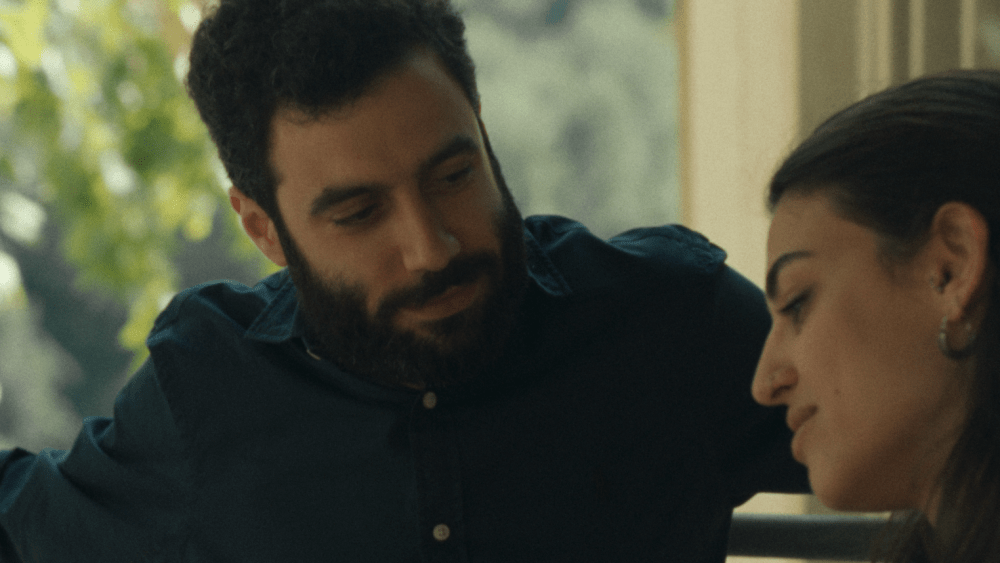A Dynamic Palestinian Drama Set in Israel
From Palestinian filmmaker Scandar Copti, the Israel-set “Happy Holidays” is a piercing, realistic family drama, the inflection points of which reveal deep cultural and political dimensions surrounding gender and ethnicity. Like his Oscar-nominated crime drama “Ajami” (which he co-directed with Yaron Shani), Copti’s second feature follows an ensemble of characters — Arab and Jewish alike — to assemble a multifaceted portrait of life in Haifa, Israel’s third-largest city.
In depicting strained family ties and rocky courtships, “Happy Holidays” veers between anxious and joyful. Copti and cinematographer Tim Kuhn shoot each interaction with an up-close, handheld intimacy that not only magnifies the subtle, powerful performances of the cast (many of them first-time actors), but welcomes the viewer into each scene, as though it were a complicated family reunion. At the center of its sprawling plot are four members of an Arab family, who share several casual, agreeable scenes together, but whose secrets from one another speak to a larger culture of silence, shame, social pressure and rampant prejudice.
The film begins on the Jewish holiday Purim, when the family is brought together by a car accident, in which their adult daughter Frida, or “Fifi” (Manar Shehab), sustains only a minor injury. While little in the story is a matter of life or death, the characters’ lives and futures are brought into sharp, unyielding focus one by one, each in their own segments.
The first is centered on Fifi’s middle-aged brother Rami (Toufic Danial), kicking off when he receives word that his pregnant Jewish girlfriend Shirley (Shani Dahari) has changed her mind about the abortion on which they’d both agreed, leading to a falling-out. For Shirley — who becomes the focus of her own chapter later on — this pregnancy means having to face familial pressures over the baby’s half-Arab ethnicity, especially from her sister Miri (Merav Mamorsky), whose otherwise personable interactions make for an unsettling contrast with her sharp venom towards Rami.
For Rami, the consequences of this storyline grow increasingly severe, escalating to the point of false accusations and racially charged assaults. However, Copti isn’t content with simply pigeonholing Rami as a victim defined by a single facet of lived existence. Danial’s performance is commendably rankled, as man who seems easily upset, and whose anger comes laced with both casual misogyny and childlike emotional baggage. More than just pitying him, we understand him through and through.
Each family member’s tale dovetails into the next. Rami, while keeping both Shirley’s pregnancy and the recent attacks on him under wraps, tries to help his father Fouad (Imad Hourani) navigate a financial debt that subsequently puts pressure on his mother Hanan (Wafaa Aoun), the protagonist of a complex maternal story in which she’s both noble savior and overbearing scold — and everything in between, thanks to the vibrant nuances of Aoun’s performance. Hanan wants to ensure that the wedding of her older daughter Leila (Sophie Awaad) goes off without a hitch, so in turn pressures Fifi to file a medical insurance claim in the wake of the accident. This yields a further complication surrounding the notion of medical privacy within families.
Fifi’s story is perhaps the most intriguing, since its layers are revealed slowly over the course of the film. In wanting to keep her medical history a secret, she claims that her records were swapped with that of someone else, in order to prevent — or at least delay — her mother learning more about her private life in college. In the process of sorting out this apparent kerfuffle, Fifi also starts seeing Rami’s distinguished doctor friend Walid, and as the two enter an exciting but undefined relationship, it still becomes cause for celebration within the family for what it could potentially mean. However, Walid’s conservative expectations of Fifi start to cause tensions as well.
“Happy Holidays” isn’t based on misunderstandings so much as differing social definitions between genders and generations of Arab men and women. However, the film’s larger cultural backdrop also swerves in and out of this patriarchal picture. The subtle racism faced by the Arab characters is, unfortunately, a commonplace element of their lives. Although Copti doesn’t directly confront the militaristic structures that contribute to these tensions, the Israeli military is an ever-present specter, especially in scenes surrounding education.
Fifi, for instance, teaches kindergarten, where the children are brought up to adore Israel’s soldiers, and where she must pass through a security checkpoint that those in uniform are simply waved through. Miri, a staunch nationalist, is forced to deal with her high school-aged daughter’s depression over her impending military service. Another generational divide also manifests in the form of teenage classmates having their concerns over occupation dismissed by guest speakers in IDF uniform. This segment, while short, has the air of a caustic, parents-just-don’t-understand coming-of-age drama, except the central mother-daughter conflict is the act of contributing to war.
Silence speaks a thousand words in “Happy Holidays,” from the tensions between family members over what’s unsaid, to quiet acceptance in the face of social norms over what they’re expected to accept as Arabs in Israel. All the while, Copti creates a vivid sense of character (and of interpersonal dynamics) by letting scenes play out with lengthy, overlapping dialogue that feels increasingly charged thanks to its naturalistic approach. It’s a film about performances, in more ways than one. Not only is every single actor a treat to watch, but they all play characters forced to play a specific role in society. It’s in brushing up against those unspoken boundaries that the drama here is born.


